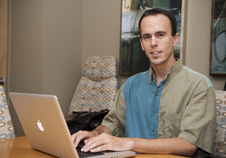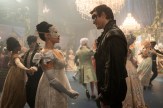Cultural connections, a click away

For many college professors, there are few sources less reliable than Wikipedia.
That’s not exactly true for Joseph Reagle, a new assistant professor of communication studies at Northeastern, who may be the first person to write a Ph.D. dissertation on the collaborative online encyclopedia, which in the past decade has become a top source of information on the web.
“I’m not going to pretend that students never use Wikipedia. That would be foolish—they use it; I use it,” said Reagle, himself a “Wikipedian,” or a regular editor of the crowd-sourced encyclopedia.
“And it’s somewhat dishonest to say you can use it, but you can never cite it,” Reagle said. “So, in my classes, I say students can use a Wikipedia article if it’s vetted and in the syllabus. Otherwise, they can use a Wikipedia article if that’s where they start and it leads them to another, more authoritative article.”
Reagle is the author of “Good Faith Collaboration: The Culture of Wikipedia,” a well-received 2010 book based on his Ph.D. dissertation. His research looks at the “free culture” movement and analyzes how people with common interests or goals form communities online.
“I was interested in things like blogs and wikis, but I was beginning to think blogs were too narcissistic and snarky, a common criticism of social media today,” said Reagle. “The people on Wikipedia certainly have their arguments, too, but there seemed to be this idea that what they were doing was important and that it was something people could benefit from.”
Compared to their real-world counterparts, online communities have a unique set of problems.
“One of the challenges of computer media and communication is that you don’t know who is on the other side,” Reagle said. “Very often, if someone edits a page you’ve been working on, you might think they don’t know what they’re doing and they’re here to wreck the project. The norm of ‘assume good faith’ means it’s best not to assume from the start that they mean harm—they might prove to be a vandal or to be doing something malicious, but it’s best to assume the best.”
Before joining the Northeastern faculty, Reagle was a fellow at Harvard’s Berkman Center for Internet and Society. He began his academic career as a computer scientist, and now at Northeastern will have the opportunity to pursue research that is not tied to a single discipline, but takes a wide-angle look at how the Internet and online communities fit into culture and the study of communications.
This semester, Reagle is teaching two sessions of a “New Media Cultures” course, which examines recent evolutions of media and communications.
“I will certainly touch on new media, but I want to touch on the cultural aspect even more,” Reagle said. “There are all these cultures online. I want to see what we can determine about them: what assumptions can we draw, what idioms do they use in their discourse, what values do they possess, and—most important—what norms do they have?”





